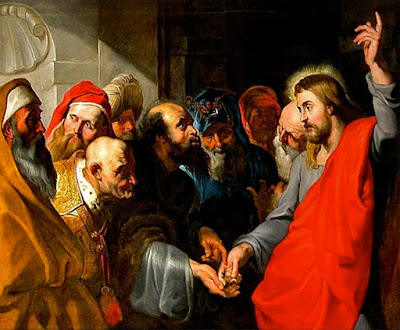In the celebration of the Mass, one of the reasons that I like to use the Roman Canon, the first Eucharistic prayer, is because it contains those two lists of saints. Following the invocation of the Blessed Virgin and St. Joseph, the priest lists of the apostles, then the first popes of rome, then a number of the Roman martyrs including a martyred deacon, a lay catechist, and two sets of martyred siblings.
After the consecration, there is another set of martyrs beginning with those whose names we find in the scriptures: John the Baptist, Stephen, Matthias, and Barnabas. Then our own patron, Ignatius of Antioch, martyred in Rome, followed by another Pope, Alexander the first, fifth Pope of Rome, and then the two saints we honor today: Saints Marcellinus and Peter.
As you know, for the first three hundred years of our faith, our faith was persecuted throughout the Roman Empire. Some of those persecutions were fiercer than others. Well, around the year 284, the most severe of the persecutions was led by the Emperor Diocletian--known as the Great Persecution. Around 3,000−3,500 Christians were executed under the authority of Imperial edicts.
Around 303, the Great Persecution reached its fiercest point. And it was then that the two saints honored today were killed. The first was Peter. Peter had been instituted in the minor Order of Exorcist. And while in prison, Peter performed an exorcism on the daughter of the prison-keeper. This demonstration of Christ's power over demons is said to have brought about the conversion of the daughter, the prison-keeper, his wife, and the entire household--all of whom were baptized by the second saint honored today, the Roman priest Marcellinus.
And the conversions continued. The pair were so successful in converting their fellow prisoners, that the Roman authorities didn’t want to risk a public execution, lest their deaths inspire even more conversions. So Marcellinus and Peter were taken to a forest in the middle of the night, forced to dig their own graves, and beheaded.
I don’t usually use the first Eucharistic prayer on weekdays. But I will today, in honor of these two heroes of the faith, whose courage inspires us to spread the Gospel, to witness to the Lord, to become instruments of God, whether in prison, or in whatever circumstances we find ourselves. Saints Marcellinus and Peter, pray for us. That we may become worthy of the promises of Christ.
- - -
Trusting in the Lord who strengthened Saints Marcellinus and Peter in time of trial, let us offer our prayers for the needs of the Church and the world.
For the holy Church of God—that, inspired by the martyrs, she may hold fast to the apostolic faith and proclaim Christ with confidence even amid opposition.
For civil leaders and those in authority—that they protect religious freedom and uphold the dignity of every person, and for all who are persecuted for their Christian witness today, may they be defended by God’s grace and become shining signs of hope.
For those entrusted with the ministry of exorcism, may they serve as courageous instruments of God’s deliverance of the oppressed, and for the conversion of sinners and the strengthening of the lukewarm—that the witness of the martyrs may rouse hearts to repentance, baptismal renewal, and zeal for evangelization.
For those imprisoned, forgotten, or isolated, for the sick, the suffering, and all the afflicted—that Christ, who conquered sin and death, may grant them strength, healing, and peace.
For our beloved dead—may they be welcomed into the company of the saints and behold God face-to-face.
God of strength and mercy, You sustained Your martyrs Marcellinus and Peter in the hour of trial; hear our prayers and grant that, like them, we may remain faithful witnesses to Your Son, who lives and reigns for ever and ever.




